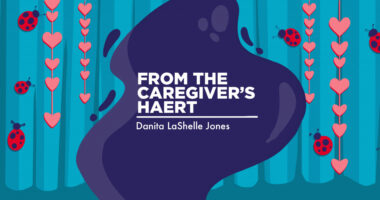
Managing HAE through the eyes of a caregiver
Written by Danita LaShelle Jones, Dec. 4, 2024
It was more than 14 years ago when central Ohio was slammed with one of the worst winter storms I’d ever seen. After being stuck in the house for a few days, my husband finally relented and took our then 4-year-old son outside.
“I’m going to walk ahead of you,” my husband, Paul, said as he zipped Ethan’s coat. “You’ll be fine as long as you walk in my footsteps.”
When they returned, my son bounced in, only slightly covered in snow. My husband was soaking wet and miserable. Because Paul had to create a pathway through the large drifts, he received the brunt of all the ice and powder blocking their way.
Ethan had a pleasant experience because someone else did the hard part first.
Recently, I realized while looking back at navigating the hereditary angioedema (HEA) journey of our daughter (whom we lovingly refer to as Ladybug), that the best way to approach managing this rare disease is to depend on the people who have gone ahead of us.
So, just like that snowy day, here are some “walking behind me” tips I can offer to anyone learning to manage HAE.
First thing to do
Explain the totality of the diagnosis to your child. Be age-appropriately honest about what’s to come. Sometimes the best thing to say is, “You’re going to have good days and bad days, but I’ll be there the whole time.”
Whatever you do, don’t assume they know what to expect. Tell them everything, and never be afraid to admit, “I don’t know.”
Ask all the questions all of the time
Ask every question in your head at every single medical appointment.
Did you leave the doctor’s office and suddenly think of a question? Call them. Is it after hours? Write it down.
You can never ask too many questions. And sometimes, the answers can change from one month to the next. Ask, ask, and ask again.
Say yes to the training
If there’s a new medication and the medical staff offers to train you or them on administering it? Say yes.
No matter your day job, field of study, or even if you are an HAE patient, you can always benefit from learning from someone else.
Need a refresher course? Call them! There is no shame in asking to relearn something. It’s the wisest decision you’ll make.
Create a separate storage system
Does the medication need to be refrigerated? Purchase a small, dorm-size refrigerator dedicated to HAE medicines — it will eliminate significant stress. There is no worse feeling than during an emergency pushing past milk or leftovers as you hunt for the right medication.
Also buy a small plastic drawer system to store syringes, gauze, needles, etc. Ensuring they have their own space removes a lot of worry.
‘Write’ it all down
With HAE patients, emergency rooms are inevitable, and doctor visits are a necessity.
Usually, you receive a barrage of questions about medications, doses, when the flare started, and how long it’s lasted. When you’re stressed, the answers may not come right away.
Don’t hesitate to make notes on your phone. It can be a great go-to when your memory fails. Also, check your app store. Many companies have created apps for HAE patients to help them manage all of the information.
Always have a ready bag
Sometimes, flares happen between medication deliveries. Or the at-home medication isn’t as effective.
When a loved one needs to go to the hospital, the furthest thing from your mind is packing an overnight bag. Have one ready and waiting just for this situation. Ensure it includes clothes, toothbrushes, toothpaste, socks, and chargers different from the ones you use every day.
Keep it in a space near the door, or keep it in the car. When you get home from the hospital, replace any items and return it to its resting place so it’s good to go for the next time.
Don’t make HAE the center of your world
As difficult as it may be, do your best not to make your child’s diagnosis the epicenter of your or their lives. Help them find themselves outside of the disease. Help them find hobbies or interests they can lean into, even when they have a hospital stay or a flare.
HAE should be something they have — not who they are.
Be unapologetic about care
HAE is rarely accommodating. It’s no one’s fault if a patient is down for a few hours, a day, a week, or more. The worst thing to do is rush to be better.
Instead, get doctor’s notes, set up a 504 plan meeting with the school, meet with the boss, or give emergency information kits to teachers. Establish with everyone that HAE is unpredictable, and let them know your child’s health and well-being are the most important things.
Connect with the HAE community
HAE is a rare disease. It can feel very isolating because you probably won’t know other people facing the challenges you face every day. The best thing to do is connect with other patients or caregivers.
Whether it’s through the U.S. Hereditary Angioedema Association or Hereditary Angioedema International, there are people out there who know exactly what you’re going through, can talk you through confusing medications or diagnoses, or can be a shoulder to cry on. Having people who understand can be just as important as having the right physician. It’s essential to your journey.
As a caregiver of someone with HAE, it took me a couple of years to learn that reinventing the wheel was unnecessary. I didn’t owe it to Ladybug to know everything and get everything right on the first try.
Like trekking through the snow, I connected with people who navigated it ahead of us. I’m determined to do the same for others. Together, we can make a clear path for those who have yet to begin this journey.
Angioedema News is strictly a news and information website about the disease. It does not provide medical advice, diagnosis, or treatment. This content is not intended to be a substitute for professional medical advice, diagnosis, or treatment. Always seek the advice of your physician or other qualified health provider with any questions you may have regarding a medical condition. Never disregard professional medical advice or delay in seeking it because of something you have read on this website.

Danita currently calls Madison, Alabama, home. She and her husband raise four exceptional children, one of which lives with hereditary angioedema — Ladybug. As a caregiver, Danita hopes that her column will show other caregivers and patients that they’re not alone. Championing the idea to “inform the world,” she seeks to reveal HAE in such a way that even if it’s rare for an individual to have it, it isn’t rare for everyone to know about it.
Recent Posts
- New study explores how adults with HAE recognize and manage feelings
- Sometimes, even our best efforts aren’t enough
- Ekterly use urged for kids with HAE 12 and older in new international guideline
- Why it’s important to maintain your own personal health information, part 1
- HAE caregiving takes heavy emotional, personal toll: Multinational survey




